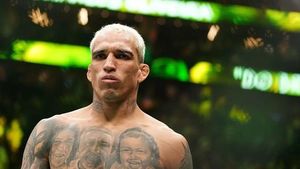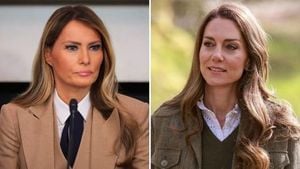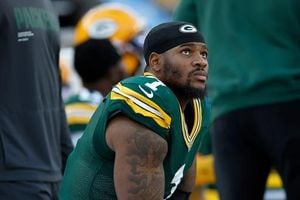On New Year’s Day 2025, revelers on Bourbon Street faced tragedy when Shamsud-Din Jabbar, behind the wheel of his pickup truck, unleashed terror, plowing through crowds and killing 14 people. This horrific act left many injured, including Ryan Quigley—a former football star and dedicated Philadelphia Eagles fan—who suffered significant injuries alongside the emotional trauma of losing his best friend, Tiger Bech, during the attack.
Quigley and Bech were enjoying the New Year festivities when the attack unfolded. Tragically, Bech, who was known for his passionate support of the Eagles, was killed, leaving Quigley to navigate the painful aftermath alone. "He would love nothing more than to be there," Quigley said, reflecting on his promise to take Bech to the Super Bowl if the Eagles made it to the big game.
The Philadelphia Eagles did not forget their fan. On January 30, they surprised Quigley at their training facility, offering him tickets to the upcoming Super Bowl set to be held on February 9, 2025, in New Orleans. The Eagles' veteran player, Brandon Graham, presented Quigley with the news, acknowledging the emotional weight of the moment. "It means a lot to change his fears," Graham noted, emphasizing the importance of support for Quigley as he prepared to return to the scene of his trauma.
Ryan Quigley expressed his gratitude for such gestures, stating, "It's been an absolute roller coaster. It's been devastating and tragic, everything that's happened with Tiger and myself. But it's honestly been so special and uplifting too, with how many people have come together from all over the world who have known Tiger and loved him." His sentiments capture the deep communal spirit and resilience at play, even amid overwhelming sorrow and loss.
Witnesses to the attack, like Tyler Burt, have shared their experiences, shedding light on the chaos and horror of the moment Jabbar’s truck struck. "I watched the truck speed two more blocks down Bourbon Street, smashing through revelers," Burt recounted, recalling the moments of terror and helplessness. He, alongside others working the French Quarter, expressed frustration with the haste to return to normalcy following such violence.
Despite the chaos, New Orleans officials swiftly aimed to resume typical life, emphasizing the economic imperatives of tourism and big events like the Sugar Bowl later scheduled after the attack. Louisiana Governor Jeff Landry framed recovery by saying, "We care about each one of the lives... We will never forget them. But it would be tragic if we let their losses be snuffed out because of fear," indicating the tension between maintaining public safety and supporting local businesses.
This push for a swift return to normalcy often overlooks the psychological needs of survivors. Tara Powell, a behavioral health expert, argues recovery from such collective trauma is slow and requires comprehensive support. "Recovery takes a really long time from these types of collective traumas. We can’t just say, ‘Oh, it’s gone. We’re OK,’” she warned, highlighting the necessity for mental health resources much needed for those affected.
Reflecting on the community’s sentiment, Jacob Finkelman—another local who observed the attack—voiced concern over the emphasis on business over human well-being. "Normalcy for us, just means making the city more money," he lamented, advocating for the acknowledgment of emotional and mental health alongside financial recovery. His words echo the feelings experienced by many who wish for more compassion amid the rush to restore business as usual.
The tragic event also sparked legal actions against the City of New Orleans, with 21 plaintiffs—including critically injured university students—filing lawsuits citing negligence. They allege city officials deviated from established safety protocols, effectively disregarding public safety. According to the complaint, "The City willfully ignored the public’s right to be safe from violence, leaving Bourbon Street exposed to just the type of attack they were warned to take all reasonable precautions to stop."
Despite the desire to honor the victims and respect those who survived, the reality of life continues. Community leaders and local organizations rally to support the victims, striving to provide care and establish fundraising efforts for those impacted by Jabbar's deadly rampage. Ryan Quigley and others await healing, hoping for provisions to seek help without the pressures of work forcing them back prematurely.
Collectively, the experiences of Quigley, Burt, and Finkelman weave the narrative of resilience following terror's horrific grasp. The emotional scars left by the New Year’s Day attack remain raw, yet there is significant strength found amid the pain, as bilateral support and compassion continue to fight against the shadows of trauma.



